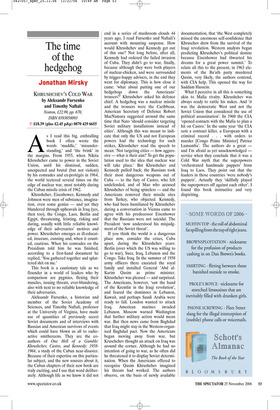The time of the hedgehog
Jonathan Mirsky
KHRUSHCHEV’S COLD WAR by Aleksandr Fursenko and Timothy Naftali Norton, £22.99, pp. 670, ISBN 0393058093 ✆ £18.39 (plus £2.45 p&p) 0870 429 6655 As I read this big, enthralling book I often wrote the words ‘muddle,’ ‘misunderstanding,’ and ‘the brink’ in the margins. From 1955, when Nikita Khrushchev came to power in the Soviet Union, until his dismissal, sudden, unexpected and brutal (but not violent) by his comrades and ex-protégés in 1964, the world teetered several times on the edge of nuclear war, most notably during the Cuban missile crisis of 1962.
Khrushchev, Eisenhower, Kennedy and Johnson were men of substance, imagination, even some genius — and yet they blundered through upheavals in Iraq (yes, then too), the Congo, Laos, Berlin and Egypt, threatening, feinting, risking and daring, usually with little reliable knowledge of their adversaries’ motives and power. Khrushchev emerges as ill-educated, insecure, cunning and, when it counted, cautious. When his comrades on the Presidium told him he was finished, according to a first-hand document he replied, ‘You gathered together and splattered shit on me.’ This book is a cautionary tale as we flounder in a world of leaders who by comparison are pygmies, flexing their muscles, issuing threats, ever-blundering, also with next to no reliable knowledge of their adversaries.
Aleksandr Fursenko, a historian and member of the Soviet Academy of Sciences, and Timothy Naftali, professor at the University of Virginia, have made use of quantities of previously secret Soviet documents and of interviews with Russian and American survivors of events which could have blown us all to radioactive smithereens. They are the coauthors of One Hell of a Gamble: Khrushchev, Castro, and Kennedy: 19581964, a study of the Cuban near-disaster. Because of their expertise on this particular subject, and the new sources about it, the Cuban chapters of their new book are truly exciting, and I use that word deliberately. Although life as we know it did not end in a series of mushroom clouds 44 years ago, I read Fursenko and Naftali’s account with mounting suspense. How would Khrushchev and Kennedy get out of this one? Not long before, after all, Kennedy had ordered the failed invasion of Cuba. They didn’t go to war, finally, because although they were both players of nuclear-chicken, and were surrounded by trigger-happy advisers, in the end they went for diplomacy. This is how close it came: ‘what about putting one of our hedgehogs down the Americans’ trousers?’ Khrushchev asked his defence chief. A hedgehog was a nuclear missile and the trousers were the Caribbean. American Secretary of Defence Robert MacNamara suggested around the same time that Nato ‘should consider targeting Soviet military installations instead of cities’. Although this was meant to indicate that only the US and not European powers had the technology for such strikes, Khrushchev read the speech to mean: ‘Not targeting cities — how aggressive — what is their aim? To get the population used to the idea that nuclear war will take place.’ But Khrushchev and Kennedy pulled back; the Russians took their most dangerous weapons out of Cuba — to the fury of Castro, who felt undefended, and of Mao who accused Khrushchev of being spineless — and the Americans removed their missile sites from Turkey, who objected. Kennedy, who had been humiliated by Khrushchev during a conversation in Vienna came to agree with his predecessor Eisenhower that the Russians were not suicidal. The President ‘now understood his misjudgment of the Soviet threat’.
If you think the world is a dangerous place now, consider the crises, Cuba apart, during the Khrushchev years: Berlin (over which the US was willing to go to war), Suez, Iraq, Lebanon and the Congo. Take Iraq. In the summer of 1958 army officers there executed the royal family and installed General ’Abd alKarim Qasim as prime minister. Khrushchev was pleased — and surprised. The Americans, however, ‘saw the hand of the Kremlin in the Iraqi revolution’, and feared the dominoes in Lebanon, Kuwait, and perhaps Saudi Arabia were ready to fall. London wanted to attack Iraq. American marines invaded Lebanon. Moscow warned Washington that further military action would mean war. But then news came from Baghdad that Iraq might stay in the Western-organised Baghdad pact. Now the Americans began moving away from war, but Kruschchev thought an attack on Iraq was around the corner. Although he had no intention of going to war, as he often did he threatened it to display Soviet determination. When the Americans offered to recognise Qasim Khrushchev imagined his threats had worked. The authors observe, on the basis of newly available documentation, that ‘the West completely missed the enormous self-confidence that Khruschev drew from the survival of the Iraqi revolution. Western analysts began predicting Khrushchev’s political demise because Eisenhower had thwarted his dreams for a great power summit.’ To relate all this to the present, in 1963 elements of the Ba’ath party murdered Qasim, very likely, the authors contend, with CIA help. This opened the way for Saddam Hussein.
What I perceive in all this is something akin to Mafia rivalry. Khrushchev was always ready to rattle his nukes. And ‘it was the democratic West and not the Soviet Union that considered the use of political assassination’. In 1960 the CIA ‘opened contacts with the Mafia to plan a hit on Castro.’ In the same year ‘the CIA sent a contract killer, a European with a criminal record . . . with orders to murder [Congo Prime Minister] Patrice Lumumba’. The authors do a great — and I’m afraid as yet unacknowledged service when they conclude that it was a Cold War myth that the superpowers ‘orchestrated handmade puppets’ from Iraq to Laos. They point out that the leaders in those countries ‘were nobody’s puppets’. Actually they ‘skilfully played the superpowers off against each other’. I found this book instructive and very dispiriting.


























































































 Previous page
Previous page